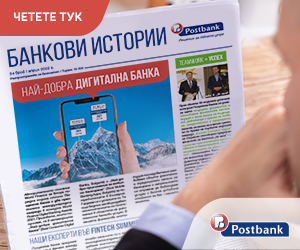Asen Yagodin: Postbank Supports Businesses with Sustainable Financial Solutions
Asen Yagodin is the Deputy Chief Executive Officer in charge of “Corporate Banking and Capital Markets” and a member of Postbank’s Management Board. He began his professional career in 1993 as a cashier at one of the Sofia branches of Bulgarian Post Bank. In the same year, he was promoted to junior dealer in the newly established “Money and Capital Markets” department, which he headed two years later. In 2001, Mr. Yagodin was elected to the Board of Directors of the financial institution, and from 2004 to 2011, he served as its CEO. In the meantime, he held positions on the Board of the Association of Banks in Bulgaria (ABB), serving as its Deputy Chairman from 2010 to 2013. In 2009, he was elected to the Board of Directors of the Bulgarian Stock Exchange – Sofia, and since early 2010, he has served as its Chairman. From 2011 to 2013, Mr. Yagodin was the CEO and Chairman of the Management Board of the Bulgarian Development Bank.
Asen Yagodin holds master’s degrees in “Finance” (1992) from the University of National and World Economy and in “Business Administration” (2005) from the American University in Bulgaria. Between 1994 and 2001, he gained additional professional experience through specializations at Salomon Smith Barney-London, the Austrian Institute for Financial Derivatives, the Ministry of Finance of Luxembourg, and others.
In 2010, Mr. Asen Yagodin received the prestigious “Banker of the Year” award, and in 2012, he was recognized with the “Mr. Economy” award for his contributions to the development of small and medium-sized businesses in Bulgaria.
Mr. Yagodin, what are the expectations and directions for your sector’s development in 2024?
This year, we continue to be a stable partner for Bulgarian businesses of all sizes—from large corporations with international significance to small family firms. We provide fresh resources and flexible financial solutions, offering balanced interest rates and other terms aligned with current market conditions. Beyond the standard offerings, this year, we placed special emphasis on financing projects that are sustainable for both society and the environment. In this regard, we signed a new guarantee agreement with the European Investment Fund (EIF) under the InvestEU program. At the same time, we are actively working on agreements with other international partners such as the European Bank for Reconstruction and Development (EBRD) and the International Finance Corporation (IFC).
How does financing sustainable projects benefit your clients?
The guaranteed agreement enables us to offer long-term loans under preferential terms with customized support schemes. This means that clients can commit significantly less of their own resources while benefiting from reduced collateral requirements for credit transactions. Financing sustainable projects focuses on renewable energy, energy efficiency in buildings, zero-emission mobility, and the implementation of digital technologies. Projects aimed at promoting a circular economy are also a key focus.
What is the nature of the projects that can receive support under InvestEU?
Broadly speaking, the projects span a wide range. For example, eligible businesses include borrowers with certifications in “clean” and “green” technologies, holders of “Eco” certificates from national and international bodies, and companies that have registered “renewable and/or clean” technology in recent years. In the area of competitiveness, the program will provide 200 million euros in new funding for small and medium-sized enterprises, aiming to boost their competitiveness, growth, and employment. Another 200 million euros will be allocated to finance green and sustainable investments.
With the new agreement under the InvestEU program, Postbank reinforces its ESG vision and demonstrates its commitment to clients by offering diverse opportunities for development in a successful and sustainable economy.
What achievements did Postbank report for 2023?
I am happy to note that 2023 was the most successful year in Postbank’s 30-year history. Our net profit after taxes and fees reached a record 308 million BGN, representing an annual growth of nearly 50%. The return on equity rose to 14.6%, more than 3% higher than in 2022, while the return on assets remained close to 2%.
What results have you achieved in the area you directly manage—corporate banking and capital markets?
In 2023, we extended over 1.1 billion BGN in new corporate loans to leading companies across nearly all economic sectors in the country. Thanks to our competitive terms and excellent service, we attracted more than 640 million BGN in new corporate deposits, bringing the total to 4.5 billion BGN. Despite the challenging market environment, we maintain exceptionally high-quality loan portfolios, with non-performing loans currently at their lowest level in history.
I am particularly proud that for the 12th consecutive year, we are market leaders in factoring services. In custodial services, Postbank has also consistently won awards for “Best Custodian in the Bulgarian Market” for the past 12 years from prestigious international publications like Global Custodian and Global Investor Magazine. These accolades recognize our effectiveness, high standards, and ambitious goals, which we continually achieve as a team. It is no coincidence that our efforts have been acknowledged at such a prestigious international level.
What business products does Postbank offer in the context of green energy?
We offer a wide range of solutions for businesses. In addition to standard credit products, we have offers tailored to the specific needs of our clients. For instance, through our “Green Loan,” we provide financing for up to 90% of the value of projects aimed at building photovoltaic power plants for self-consumption with installed capacities of up to 2 MWh and a maximum financing amount of 2 million euros. The loan repayment period is extended, and investors can benefit from a grace period of up to 18 months.
What is the interest level in these green projects?
Interest is significant. In Bulgaria, solar energy is gaining momentum, and we are seeing many projects take advantage of our products. Clients greatly appreciate our flexible terms and competitive pricing.
Mr. Yagodin, what are your predictions for bank consolidation and market trends now? Will we continue to see “big fish swallowing smaller ones”?
Ha-ha, that’s a great question! In the financial world, there is always movement and change. Bank consolidation is a process that will continue because mergers lead to stronger and more sustainable institutions, which is highly beneficial for clients and society as a whole . However, let’s not forget that “small fish” can also be quite adaptable and innovative. The market is changing rapidly, and the key for all players—big or small—is to remain flexible and capable of adapting to new realities. Ultimately, everyone benefits when there is healthy competition among stable and innovative players.











